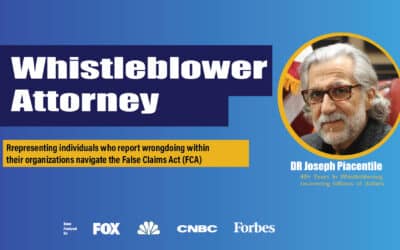EXPOSE DEFENSE CONTRACTOR FRAUD
EXPOSE DEFENSE CONTRACTOR FRAUD
CONTRACTOR FRAUD OVERVIEW
Defense contractor fraud occurs when a private company contracted by the U.S. Department of Justice (DOJ) does not satisfactorily provide the military with the goods or service it was paid for. Whistleblowers may report private contractors who defrauded the government by falsifying their records to receive higher payments, underdelivering or providing defective products.
WHAT IS DEFENSE CONTRACTOR FRAUD?
The U.S. government relies on private companies to deliver on their promises across many sectors, but none is arguably more important than the goods and services provided to the government by defense contractors. These “goods and services” can be anything from combat equipment for soldiers to critical intelligence analysis performed by private technology contractors. Whatever equipment or services they may be, U.S. servicemen and women rely on them to protect American interests abroad and at home.
Each year the U.S. government spends approximately $500 billion on defense and international security. This amounts to about 20% of the Federal budget. As the role of private contractors has expanded within the Department of Defense so have their costs. In 2014, the top 10 defense contractors alone accounted for $110.3 billion in spending. When fraud is committed under these circumstances American taxpayers are left to pick up the tab as their taxes are shifted to overpay for government contracts instead of being reinvested into services and communities that would benefit citizens. A Department of Defense report prepared in the Senate found that since 2011 hundreds of defense contractors who had defrauded the government were awarded $1.1 trillion in contracts.
In order to reduce and discourage defense contractor waste and fraud, the Department of Justice created a whistleblower reward program to find and prosecute corrupt defense contractors. Since 1987, the Department of Defense has recovered $2.6 billion from defense contractors who defrauded the government under the False Claims Act. Due to their part in the government’s recovery of fraudulent funds, whistleblowers have received $455 million for reporting defense contractor fraud.
EXAMPLES OF DEFENSE CONTRACTOR FRAUD
VIOLATING FEDERAL CONTRACT TERMS
When a company lies about fulfilling terms specified in a federal contract.
Example:
Sometimes, before a federal contract is secured with a company, the government will require that the business is owned by or employs U.S. veterans. Some unscrupulous companies misrepresented or lied about their background in order to circumvent the requirements, committing a False Certification crime.
FAILURE TO COMPLY WITH CONTRACT SPECIFICATION
This includes omitting quality procedures, required testing, or other steps in the production process.
Example:
Purchasing vehicle parts of substandard quality from an unauthorized source even though the contract specified that products delivered are to be built using specific guidelines.
OVERBILLING AND INFLATING EXPENSES
Private companies may intentionally inflate contract costs, timelines, or required resources.
Example:
Although the military may have paid to receive high-quality equipment, goods delivered are then discovered to be inferior, defective or outright broken. In other instances, mercenary troops who were paid to provide security services on U.S. bases overbilled the Army for employees who were not physically present in the base.
WINNING A CONTRACT THROUGH KICKBACKS OR BRIBES
In order to secure their business or work on another federally-funded project, some companies bribe or provide gifts to U.S. officials.
Example:
Kickbacks include both direct payments (bribery), as well as other indirect favors such as expensive gifts, paid vacations, or the hiring of a relative.
CONTRACTOR FRAUD AND THE FALSE CLAIMS ACT
All forms of government contractor fraud are prosecuted under the False Claims Act. The Department of Justice regularly relies on individual whistleblowers to come forward and help root out fraud and corruption. In return, the government provides whistleblower protections and whistleblower rewards.
Contact Us Today
The information submitted will be submitted to the law firm of Piacentile, Stefanowski & Associates LLP d/b/a Whistleblowers International. This communication does not create an attorney-client relationship and is submitted only for the purpose of evaluating your claim to see if this is something we are able to help you with. By contacting us, you certify that you are a potential client making a bona fide inquiry about obtaining legal services to address a potential whistleblowing legal claim. Past results do not guarantee future outcomes. While this submission does not create an attorney-client relationship, all information submitted will be kept strictly confidential per legal ethics rules since this information is submitted in contemplation of a potential attorney-client relationship. No attorney-client relationship is formed until it is determined after evaluation with you that this is something we can take on and a retainer agreement is signed by you and the law firm of Piacentile, Stefanowski & Malherbe LLP d/b/a Whistleblowers International. Please also understand that by submitting your information, there is no guarantee that we will contact you in response, as at any given time, there are only a limited number of claims we are able to take on and pursue. If we do not contact you within 3-business days of your submission, please reach out to another whistleblower law firm if you are interested in pursuing your matter.
Our Areas of Practice
Healthcare Fraud
Securities / Derivatives Fraud
Fraud Against the Government
Tax Fraud
Cryptocurrencies Fraud
Defense Contractor Fraud
Money Laundering
Foreign Corrupt Practices Act
DR. JOE’S CASES HAVE BEEN FEATURED IN:





COMMITTED TO GLOBAL TRANSPARENCY
Unmasking Investment Fraud: A Private Investigator’s Guide to Navigating Financial Scams
As a private investigator specializing in investment fraud cases, I've seen countless victims fall prey to sophisticated schemes that exploit their trust and hard-earned money. Over the years, I’ve gathered insights on how to spot fraud, protect investments, and take...
Whistleblower Attorneys: Protecting Those Who Speak Out Against Fraud
At Whistleblowers International, we specialize in representing courageous individuals who report fraud, misconduct, or illegal Whistleblower Attorneys: Protecting Those Who Expose Fraud At Whistleblowers International, we are...
Financial Crimes Enforcement Network (FinCEN): An Overview
The Financial Crimes Enforcement Network (FinCEN) is a bureau within the U.S. Department of the Treasury that plays a critical role in safeguarding the financial system against illicit activities such as money laundering, terrorist financing, and other financial...
The information on this website is for general information purposes only. Nothing on this site should be taken as legal advice for any individual case or situation.
We do not accept cases in all jurisdictions. No representation is made that the quality of the legal services to be performed is greater than the quality of legal services performed by other lawyers. Prior results do not guarantee a similar outcome. This information is not intended to create, and receipt or viewing does not constitute, an attorney-client relationship. While we will treat any information provided as privileged and confidential, you should understand that when you provide information about a potential case to us, we do not become your attorneys. We do not represent you until we have agreed to do so and a retainer has been signed by both of us. This information is not intended to create, and receipt or viewing does not constitute, an attorney-client relationship. This website may be considered attorney advertising in some states.
© 2024 All Rights Reserved.



